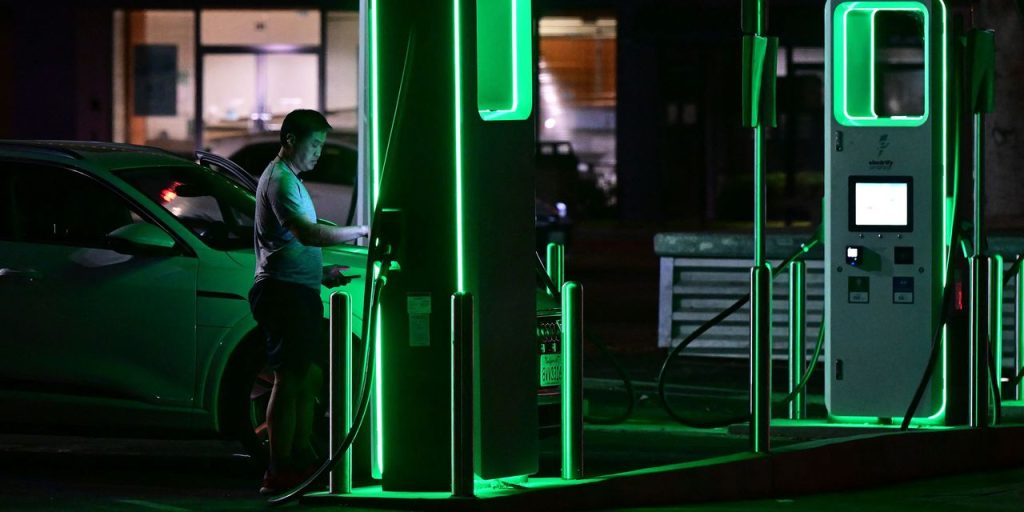The Biden administration has signed on a new round of public and private commitments to add electric-vehicle (EV) charging options around the U.S. beginning now and into the next several years, it said Monday.
The commitments include investment pledges from ride-share giant Uber Technologies Inc.
UBER,
+0.98%,
Zipcar and other tech companies and add to the list of participants the White House first announced in February. At that time, the Biden team said it had negotiated with Tesla
TSLA,
-2.02%
to open thousands of its proprietary SuperCharger stations to wider use.
Related: Tesla unlocks EV network. What’s next in push to make chargers ‘as easy as filling with gas’
Biden has set a goal of at least 500,000 chargers, including a presence in all states, by at least 2030. He has said that’s an important step toward his goal of EVs comprising over half of new car sales by 2030.
The new rollout announced Monday would add more than 100,000 public EV chargers to the more than 135,000 now available throughout the country.
“These commitments are part of President Biden’s Investing in America agenda to spur domestic manufacturing, strengthen supply chains, boost U.S. competitiveness and create good-paying jobs,” the administration said.
The rules set this year have made clear that all new chargers built with federal funds must support the Combined Charging System (CCS) plug standard, which means more electric models can use the same charger. Currently, the CCS standard is used by most automakers other than Tesla.
Don’t miss: Biden floats toughest-ever auto tailpipe emissions restrictions, which could boost sticker prices
In all, the additional participants announced Monday include:
- Blink Charging, which is committing to invest $49 million to increase its manufacturing capacity in Bowie, Maryland from 10,000 to 40,000 chargers per year by 2024.
- Zipcar, which is committing to allocate 25% of its electric vehicles to disadvantaged communities in 2023.
- Uber, which said it aims reach 400 million EV miles driven on its platform in the U.S. by the end of 2023 by distributing resources through its Green Future program to help hundreds of thousands of drivers transition to EVs and through its partnerships with automakers, rental companies, and charging companies.
-
Pacific Gas & Electric
PCG,
-0.06%
and Ecology Action commit to directly install approximately 2,000 electric vehicle (EV) charging ports at no cost to customers at approximately 450 multifamily properties and small businesses in underserved communities by 2025 to increase access to charging and EV adoption. - National Automobile Dealers Association (NADA) and Center for Sustainable Energy are committing to launch online dealer training in 2023 that will be available to over 180,000 salespeople at NADA’s 16,000+ member dealers to help them master the nuances of selling electric vehicles and accelerate mass-market EV adoption.
The White House also highlighted:
- Enel X Way is committing to sell over 2,000,000 EV chargers in North America by 2030, including over 10,000 public DC fast charging stations, and is also committing to enter the North American EV public charging station market in 2023.
- Walmart is committing to install new electric vehicle fast-charging stations at thousands of Walmart and Sam’s Club locations across the country by 2030.
- City officials in Madison, Wisc., have committed to converting its entire fleet of about 900 vehicles to EVs by 2030.
For sure, the interest level in EVs has moved higher over recent years. EVs made up 5.8% of new U.S. vehicle sales in 2022, their most to date. There are over 130,000 public chargers now available across the country – with all 50 states now implementing a federal investment to build a new national charging network, according to the White House. The private sector has committed more than $120 billion into the American-made electric vehicle and battery supply chain in the last two years alone.
But when asked directly, some polls show a majority of Americans aren’t yet sold on going electric for their next purchase, hesitancy they pin on higher prices relative to traditional cars and what they feel are too few charging stations.
About 4 in 10 U.S. adults are at least somewhat likely to switch to an EV for their next buying round, said a recent poll by The Associated Press-NORC Center for Public Affairs Research and the Energy Policy Institute at the University of Chicago. Only 8% of U.S. adults say they or someone in their household owns or leases an electric vehicle, and 8% say their household has a plug-in hybrid vehicle.
Read the full article here




